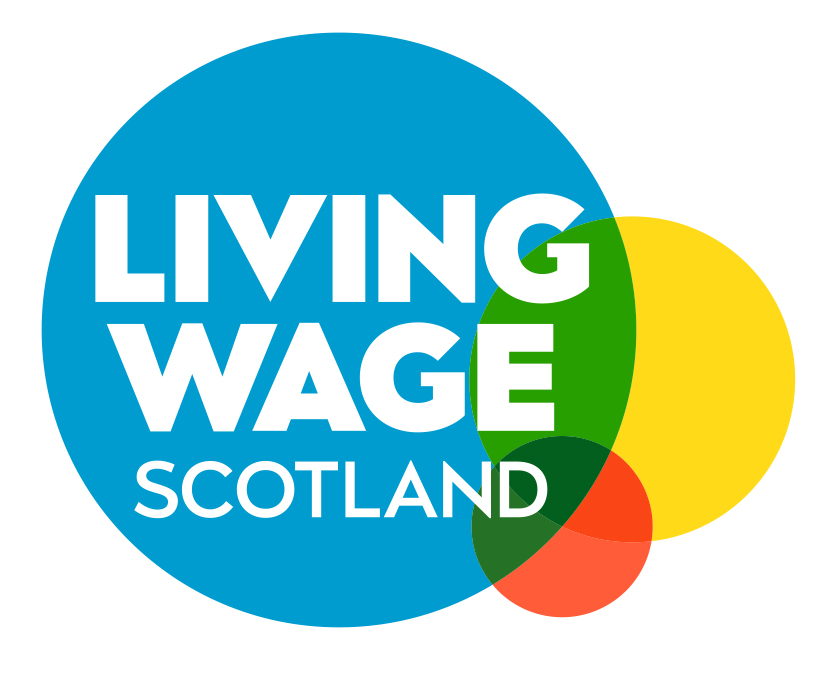by Lynn Anderson, Living Wage Scotland Manager
At the start of Challenge Poverty Week 2023 in Scotland, Joseph Rowntree Foundation published their annual Poverty In Scotland report, which included a special focus on work. The findings are concerning: poverty in Scotland has deepened, with increasing levels of in-work poverty; it is much worse for some groups in our society; government policy is not going far enough to tackle poverty, and there is a particular need to refocus our attention on the role of our labour market.
In particular, the report helps us begin to unpack the role of specific industries on levels of in-work poverty, noting that a huge proportion of people impacted by in-work poverty are clustered in retail, hospitality, health and social work, administrative and support services, and manufacturing.
The Poverty in Scotland report contains useful recommendations for those seeking to engage employers on practice change, (like our Living Wage Scotland team based at the Poverty Alliance), and importantly, for employers themselves.
To provide context on the scale of the problem, despite record increases in statutory wage rates in recent years, including the national living wage, work is still not a guaranteed route out of poverty. Around 60 per cent of children living in poverty in Scotland live in a household where are least 1 adult works. Sadly, this statistic has not changed much in recent years. While there have been welcome increases in statutory wage rates, and a surge of voluntarist support for the real Living Wage by employers, even increased wages have not kept pace with living costs.
In autumn 2022, the ONS Labour Market data showed improvements on low pay levels across the UK. The number of jobs paying at least the real Living Wage reached their highest levels ever, and around 91% of jobs pay at least the real Living Wage in Scotland. However, Living Wage Foundation flagged at the time in their analysis of the data on Jobs below real Living Wage, that this trend was not secure. It is predicted that due to wages lagging behind inflation and the cost-of-living crisis continuing, that the number of low paid jobs across the UK would climb again. It’s vital that we accelerate the efforts to encourage more employers across our labour market, particularly in industries where low pay is pervasive to pay at least the real Living Wage, so that progress on this measure is more secure in the long term.
When living on a low income, a much higher proportion of that income is spent on essentials like housing, food, energy, transport, and childcare costs. There is often not enough to cover all the additional goods and services deemed necessary by the Minimum Income Standard research, to provide workers with adequate income to participate and thrive in modern society. The income needed will vary according to household composition, and personal circumstances, but payment of at least the real Living Wage is a necessary starting point.
Of the 3000+ accredited Living Wage employers in Scotland, not all of them will be aware of the poverty statistics, but they do know that their voluntary decision to commit to paying at least the real Living Wage is a decision that is welcomed as a step in the right direction. We cannot successfully challenge poverty in Scotland when wages are less than the real Living Wage, and all employers are encouraged to take that first and vital step by becoming Living Wage accredited.
The Poverty in Scotland report outlines that five high-priority industries contribute significantly to in-work poverty – retail, hospitality, manufacturing, health and social work and administration and support services. Of the households affected by in-work poverty, most of them (almost three-quarters), have at least one adult in their household working in one of these industries.
Of the workers earning less than the real Living Wage (which is the definition of low pay used in the report), more than 10% of them have been locked in low pay for many years. Most people (80%) that experience persistent low-pay work in one of the five high priority industries, suggesting that these industries are operating on low pay models without effective progression routes to higher paid roles. Both the risk of in-work poverty, and the likelihood of being trapped on low pay for a prolonged period is higher for women, disabled workers, and workers from minority ethnic groups. Employers seeking to improve the experience for workers most at risk of in-work poverty can implement Living Hours as a mechanism to ensure security of hours and contracts alongside a real Living Wage.
The Living Wage Scotland team have engaged with thousands of employers, including many in these priority industries. There are challenges in implementing the real Living Wage and Living Hours that are more acute for some employers compared to others. Yet, we have found regardless of industry, the choice to commit to these standards is a values-driven one. Most employers want to do the right thing by their workers and are horrified to learn about the harmful effects of low pay, insufficient or insecure hours and unpredictable work patterns on their people. A recent survey of Living Wage accredited employers in the UK found that employers wanted to stay accredited and be part of the Living Wage employer movement because the scheme contributed to the reduction of in-work poverty. In short, employers care about poverty levels, and they want to make a positive difference.
We have been inspired by organisations that value their people as their strongest asset, and who look for opportunities to invest in their workforce. When reflecting on our engagement with Hospitality & Tourism employers, we have learned about some of the challenges they face along the way, and importantly, that a growing number of employers are seeking new models of success in their industry, that celebrate careers in their industry, not jobs that are sometimes perceived as stop-gaps. We have been able to build our own intelligence on ways employers in different industries overcome challenges to changing their practice, and one key recommendation is to lean on the experience of others that have done it successfully. Our team have found success in celebrating employers that implement the real Living Wage and Living Hours by offering a confidential service of listening, learning, and supporting them to do so. We have in turn, been able to better support employers with examples on what has worked for others.
Employers can be reassured that actions to implement the real Living Wage often reaches some of the workers that need it most. When Living Wage Scotland conducted a snapshot analysis of Living Wage employer accreditation data, it found that of the workers benefitting from a wage increase to the real Living Wage as a result of their employer becoming accredited with us, most were women, and most worked part time. Tackling persistent low pay requires further interventions, such as better engagement with workers, ensuring development and progression opportunities are targeted at those who need it most (women, people with disabilities, younger workers, minority ethnic groups), and considering overall job design. However, some of the fundamental components of in-work poverty will remain issues of pay, contracts and hours. Living Wage and Living Hours are well defined actions that employers can choose to take today.
To expand on this, I’ll paraphrase Michael Cusack from ACS Clothing, who spoke at the launch event for the Poverty In Scotland 2023 report, who said:
“…We consider ourselves a business with purpose, who are trying to make a bigger impact on society. Poverty is a worry for us. We’re paying the real Living Wage, and are committed to Living Hours, and we are actively working with people with barriers accessing the labour market, for them to be part of our business expansion. We’ve won awards for all these actions, but the reality is, these are small things, that all employers should be doing.”
There are many lessons and reflections for us all from the Poverty in Scotland 2023 report, and I encourage any employer with the intention of working towards Living Wage or Living Hours accreditation to engage with the Living Wage Scotland team, so that we can support you on that journey.

